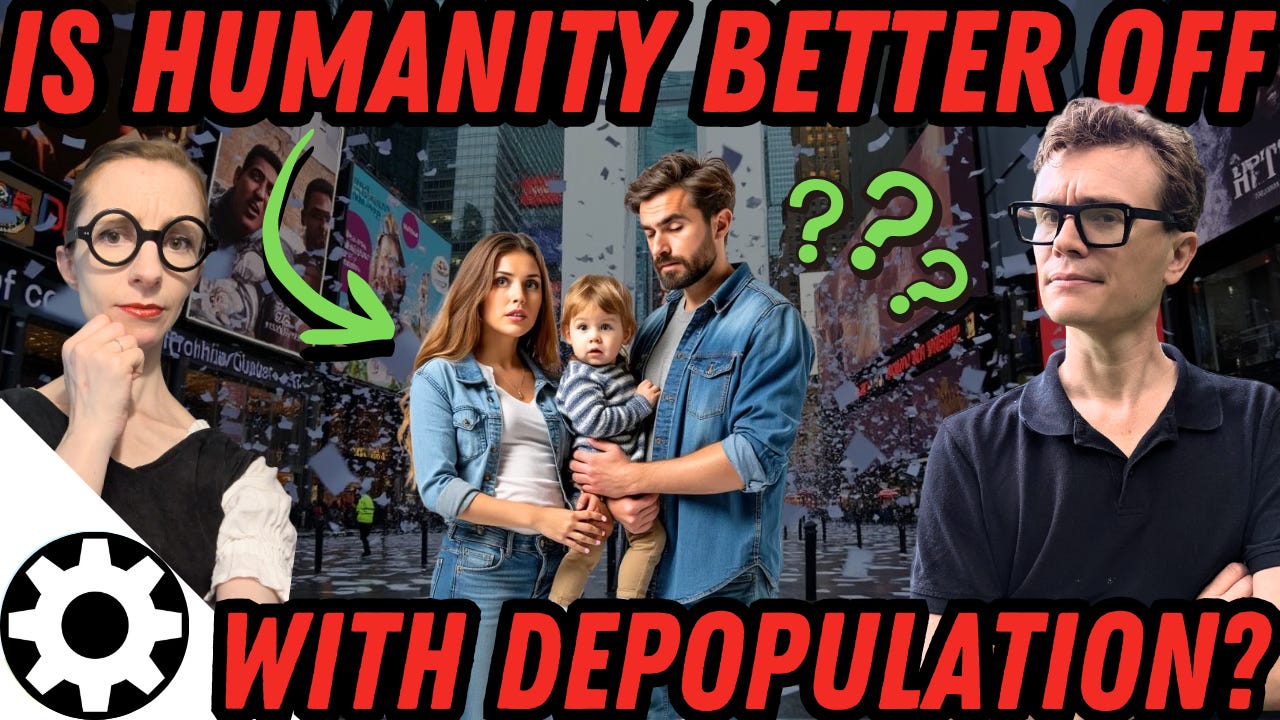Taking "Degrowth" Seriously: What is the Actual Ideology/Logic of Those Who Want to Shrink the World?
Description
Join Malcolm and Simone Collins as they dive deep into the philosophy and policies of groups advocating for global population reduction. This episode explores the arguments, motivations, and potential consequences of “degrowth” movements, including controversial proposals for family planning, technocratic governance, and the future of human flourishing. The hosts critically examine the data, challenge utopian and dystopian visions, and discuss the real-world implications for society, technology, and culture. Whether you’re curious about demographic trends, environmental debates, or the ethics of population control, this conversation will challenge your assumptions and spark new questions.
Malcolm Collins: [00:00:00 ] Hello Simone. I’m excited to be here with you today. Today we are going to be discussing the philosophy of the people who are aware that demographic collapse is happening. The, you know, broadly saying, aware of its consequences, but want to facilitate its continued existence and how they think that this is gonna work out.
Okay. Because I’ve, I’ve heard of these people, you know, the, the degrowth people, right. The well we can manage, like, we can make things better with an older population in everything like that.
Simone Collins: And like, this is good. I’m just picturing the dog in the fire ridden building.
Malcolm Collins: Yes. This is fine. Yeah, I kind of blew this off.
But we haven’t, well maybe they’re onto
Simone Collins: something. What if we’re wrong? If we’re wrong, we wanna be corrected. Right? Yeah.
Malcolm Collins: Reach out to us that has these beliefs. Mm-hmm. And they were very nice. And they sent us to their website. And this group is called the O-V-O-L-P-E Foundation. Hmm. Overlap. I, I don’t know how to pronounce it.
And they do a lot of work on trying to get girls to have a fewer kids. [00:01:00 ] I, I will say that normally I wouldn’t care about this work, but guess what country they, they do this work in most.
Simone Collins: Ah,
Malcolm Collins: Thailand. Do you know what Thailand’s TFR is? It’s round one. This work is genocidal at that rate. That means the population is halfing every generation.
That’s one of the lowest, like the the going to their approach. Wouldn’t
Simone Collins: they wanna do this in like a really high fertility country? I mean, yeah, they do do it in,
Malcolm Collins: One other country. I wanna say tan Tanzania, which is higher fertility, like 4.5. And so that’s, that’s reasonable there. But in Thailand, I’m like, if there’s any country where you don’t wanna be doing this, that’s like doing it in Korea or something.
Keep in mind, Thailand’s fertility rate is one, and Korea is like, the lowest on Earth is like 0.75. Yeah. So this is close to the lowest fertility rate on earth.
Simone Collins: Yeah. I mean at that point it’s, it’s already happened. You don’t have to worry about it. You Yeah. You don’t have to worry places that are involved.
2.1 at least
Malcolm Collins: kicking a dead dog at this point. We should ask them about that. I wanna to go into their own words. Okay. Both [00:02:00 ] from the chain of emails they sent us and from their website so we can understand how they wanna structure society. And I’ll start with just sort of the wider plan here which we won’t talk about too much, but it’ll give you an idea of where we’re gonna be going with this conversation.
Okay. The goal here is on one hand, the wellbeing of children, including the widespread good education, and on the other hand, equal opportunities and prosperity for all citizens of the world. The key message here as follows, fundamental right to one child per couple. This child will be supported through compulsory education, medical care, nutrition, and if necessary, financial assistance from the global community, at least until UNESCO ISCD level two or possibly level three registration with the child protection Authority.
The CPA is mandatory. A second child is subject to conditions. Both parents must demonstrate and be able to independently financially support both children up to employability. Approval by the CPA is required for the third child onwards. Additional [00:03:00 ] requirements applied in addition to the requirement for approval.
Progressive child tax policies are levied. So basically the more kids you have, the more you have to pay in taxes rather than the less. And then they go on to say in this section, this is to ensure that school attendance by less privileged children is refinanced by child taxes, by wealthier families.
Presumably it would be the wealthier families who are allowed to have far more children. Right? So it’s like wealthy people can have, you could hear these like elements of ness to this, right? A, a dictatorial world government where only the wealthy can have more than two children, or really more than one child.
Yeah. It seems
Simone Collins: like many sci-fi dystopias where you, you have, you can’t afford to pay the government credits to have an additional child or whatever. But,
Malcolm Collins: but I, but what I’m saying here is this isn’t. Token wokeness, right? Like this is, yeah, no,
Simone Collins: no, no. They’re, they’re doing stuff that people would see as, as quite controversial because they believe it’s the optimal way to go, which I appreciate.
Malcolm Collins: So, to continue here, this could also counteract current problems such as hunger, disease, and child labor. I realize [00:04:00 ] the global implementation of such a regulatory system is still utopian at the moment. I love, he uses the word utopian, where even with me, when I describe my utopians, I at least realize that to the average person, they sound dystopian.
And I would guess that to your average person, this would sound extremely dystopian, right? Like, that’s not just me. You, you, you have a better ability to emulate Normies. Normies would see this as dystopian, right? The, the CPA, which monitors all children worldwide. Normies would
Simone Collins: absolutely see this as dystopian.
Malcolm Collins: Okay? But democracy, healthcare, computers and cell phones were also utopian not so long ago, and unfortunately still are for many people in the world today. So I’m starting with that because I think that, that this gives you an idea of the type of world structure that they’re gonna be imagining here.
It, like, he seems to indicate that he sees democracy as a good thing but it’s also pretty clear that this type of world structure is meant to operate under a global technocracy closer to the UN or the eu where you have some, you know, token demographic democratic [00:05:00 ] elements, but they don’t really determine who’s running things.
That’s more a technocratic element. And we can talk about the benefits of that kind of system later. But, but that’s, that seems to be what they’re presupposing here. And I’d also point out with a system like this they, you know, our fans who are like, are aware of falling fertility rates and everything like that.
They can laugh at this when they hear it and be like, what an evil system is that? But I’d point out that we could be living in a reality. We’re such a system as this was necessary. There absolutely is a, like, honestly, even if I, if I lived in like the seventies or something right? And I was just looking at global fertility trends, I was looking at global populations.
Mm-hmm. And you were like, what are you gonna do about it? And my response would probably be like, well, I don’t wanna talk about this publicly, like right now, because it would be very offensive, but we probably need to do some sort of restriction eventually. Like, this doesn’t seem [00:06:00 ] mathematically realistic forever.
And the consequences of this could be staggering. Right. And even, even outside of that, even if you’re like, well, in the seventies you still should have known a population collapse was coming. Imagine we’re on like a spaceship or something, right? Like, like feasibly Earth might have like limited resources, right?
Right. Like feasibly, right? And, and so there’s like a point on the spaceship where, you know, everyone’s having too many kids and you as the captain have to like, come in and say, okay, but we like this. We don’t have the food or the oxygen for this anymore, right? So, I’m just gonna cut oxygen Russians to like sector C for this week and we can repopulate in a b***h or we can do you know, stop having so many kids, right?
So what I’m saying here is if you accept the premise that like we are anywhere near or securing capacity, and you accept the premise that the population is still going up I can see. Where [00:07:00 ] something like this might be necessary. Right. I just don’t think we’re anywhere near that. But, but what I’m saying here is the types of people who get into these ideas.
One, this is an organization in Switzerland, so very Swiss culture, you know, watchmaker world right here. And two, a lot of them grew up during an age where it’s, it’s very hard for older people to grok and turn around and be like, oh, the world is fundamentally different now than it was when I was growing up.
Simone Collins: Yeah. And to your point, there’s something very responsible about saying, I don’t know how we’re gonna feed all these people. And just to blithely assume that we’ll develop technology, which we ended up doing, that we’ll be able to sustain all these people. And now we’re at a juncture also where we’re abl
























